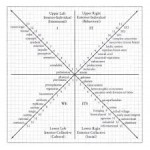|
|
By davidpetraitis, on April 1st, 2014 
In recent writings on Ken Wilber’s site Ken deals with some issues that have been vexing my mind for several years. When we start to talk about the higher level of spiritual realization, attainment, states and structures known in Ken’s writings as the subtle and the causal, practitioners such as advanced yoga teachers, mystics and philosophers like Ken speak of subtle and/or causal matter and energy. This has been for years a source of profound semantic confusion and source of scientific disdain for spiritual matters. I believe information science has some equally important concepts to add to our understanding of spirit. . . . → Read More: Ken Wilber’s Subtle Energies and Spiritual Information Theory
By davidpetraitis, on June 23rd, 2013 Accept everything, wherever it comes from, in slience and peace, and with an equal mind, render your imagination bare of the images of all physical things as is appropriate to your state and profession, so that you can cling to him with a bare and undivided mind… . . . → Read More: A bare mind
By davidpetraitis, on May 22nd, 2013 Lord, make me taste by love what I taste by knowledge; Let me know by love what I know by understanding. I owe you more than my whole self, But I have no more, And by myself I cannot render the whole of it to You.
Draw me to you, Lord, In the fullness of Love. I am wholly yours by creation; Make . . . → Read More: A prayer late at night
By davidpetraitis, on May 14th, 2013 Once extinguished
The light of the candle is
Forgotten by the walls of my room.
My cup overturned; empty on my desk
Journal open to the last page.
A moon rises through the trees;
I am gone.
By davidpetraitis, on April 15th, 2013 When talking about the amazing restless of the mind Buddhists often call it the monkey mind. I found this gem from Ajahn Chah on using the mind to understand the mind:
Let me give you an example. Suppose you have a pet monkey at home. It doesn’t sit still. It likes to jump around and grab hold of things. That’s how monkeys are. . . . → Read More: If we understood monkeys….
By davidpetraitis, on November 1st, 2012 I am starting a series of what I am calling Gentle Realizations with this post. They are things that I come up with when I ask myself what I would like to tell my children and grandchildren concerning the important things in life and the spirit.
Some of these are paradoxes at the heart of human being. And this one is one of . . . → Read More: Gentle realizations: The mind is used to investigate the mind
By davidpetraitis, on September 28th, 2012 Every once in a while I get just a glimpse of the sublime. Walking down Madison Ave. in Midtown one is surrounded by luxury goods shops, upscale boutiques, antiques and well dressed men and women going about their business. Among them I walked too, and thoughts of Dzongsar Jamyang Khyentse’s exposition of the “four seals” of Buddhism in “What Makes You NOT a Buddhist” resonating in my mind. . . . → Read More: Madison Boddhisattva
By davidpetraitis, on September 28th, 2012 Greed is good
Gordon Gekko is alive and well. His paean to greed is being echoed in the values and narratives of the people and the politicians and the economists that support a particular class in the US.
Well, ladies and gentlemen, we’re not here to indulge in fantasy, but in political and economic reality. America, America has become a second-rate power. Its . . . → Read More: Greed and power narratives
By davidpetraitis, on August 6th, 2012 If one arrogates something to oneself one takes it as a right, and claims it over and above the claims of others. Arrogance is a claim for precedence. Putting oneself ahead of others, or as its defenders might say ahead of the pack. It is interesting etymologically that rogation comes from the act of stretching one’s hand out, or, in today’s parlance, panhandling. The beggar is asking for something the arrogant one is taking it for themselves. It is my worry that the world I am bequeathing to my children is a world in which they will need to confront and resist a new rise of this type of thinking. . . . → Read More: History and Arrogance
By davidpetraitis, on July 18th, 2012 I have been mulling over writing a new manifesto for today, something that will capture my thoughts as a political platform. This piece by Thorten Parker called What do you want for America opens with a good statement of the background of the case for a new American manifesto thusly:
People who understand how this country’s financial system works know the American dream . . . → Read More: Towards an new American Manifesto
|
